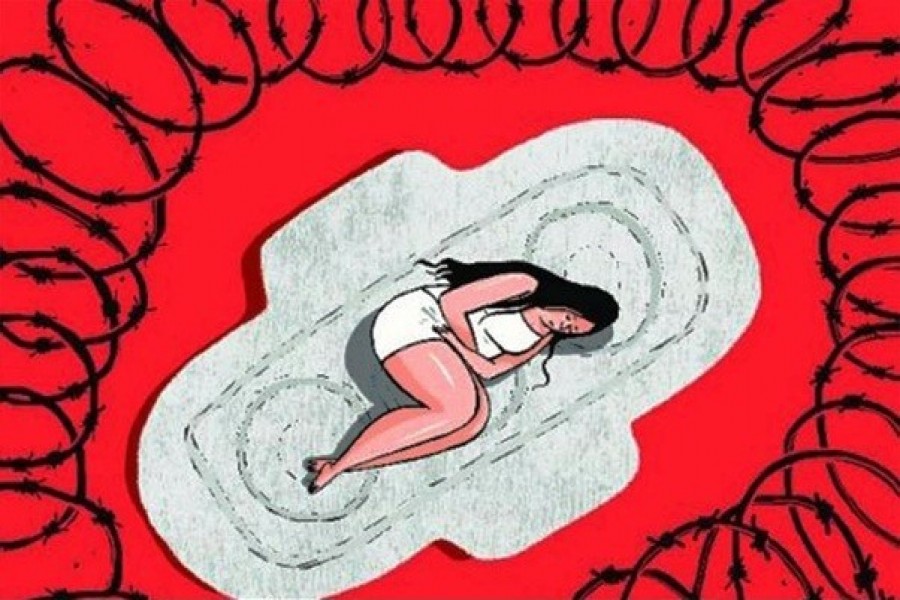In most places in South Asia, menstruation is not really something that we want to talk about. For as long as I can remember, the topic has been shrouded in mystery, only making its way into a conversation through whispers and hushed tones. But I will speak up now because girls need our support to ensure that they can go about their daily lives as they choose, even when they have their period.
We all know how important education is for every young person and for our societies to thrive and do better. So, it is quite shocking to learn that more than one out of three girls in South Asia miss 1-3 days of school during their periods.
Why? Many girls report that if there are toilets at their schools, they are often too dirty to use, with no water available to clean themselves or dustbins to get rid of their sanitary pads. Often schools do not have separate toilets for girls and doors do not have locks or proper lighting to offer girls the needed privacy or comfort.
For schools to provide a clean toilet with a proper lock on it and a bucket with a lid should not be incredibly difficult, and I will encourage all schools to support girls' education in this way. That is the least we can do!
Menstruation is part of every girl's life, a natural development that takes place in every female body. It marks an important transition in the life of a girl as she steps into adolescence and then into adulthood.
This is an important time of change for all girls. She needs support from her family, her friends and her school to keep learning by staying in school when she has her period.
What is also troubling is the fact that many girls still do not know anything about menstruation when they get it. Imagine the fear and embarrassment when a young girl discovers that she is bleeding and maybe has no-one to talk to about it.
Or being under constant stress for fear of staining her clothes and inviting ridicule from family and friends. That would be a traumatic experience for anyone.
New research from United Nations Children's Fund (UNICEF) and Water Aid shows that it varies how good we are at preparing our young girls for menstruation.
In Sri Lanka, 60 per cent of the girls that were asked responded, that they did not know what was happening to them when they had their first period. In Bangladesh, 36 per cent of the girls did not know.
It can, of course, be difficult to talk about menstruation with your daughter. As parents, maybe it makes us uncomfortable and we do not know how to start talking about the issue.
But somehow parents need to find a way. And they do have the responsibility to prepare their daughters - and sons for that matter - for this important development, as do school-teachers and other adults.
Information about what happens to the body when children turn into adolescents is something every good school should provide.
We grown-ups should de-mystify the widespread myths and taboos that exist, with menstrual blood seen as "dirty" and menstruating women seen as "impure" and "polluted".
In many places, menstruating women are restricted from using toilets, entering temples, performing rituals, touching cows, consuming milk products etc. Often the shame and stigma attached to menstruation have prevented girls and women from any discussions related to it.
Prevailing social norms have also prevented boys and men from engaging with the issue or supporting women. And, the practical problems in terms of dirty toilets, lack of privacy and facilities to wash has become personal problems that no-one dares to mention.
Around the world girls are struggling to stay in school when their menstrual hygiene needs are forgotten or ignored, yet the water, sanitation and hygiene and education sectors have remained reluctant to address the issue.
Menstruation is also one of the very common factors for girls to drop out from schools and achieve their dreams. Be it a parental pressure or social norms, girls are demotivated to join any kind of sports that they like.
The taboo and hype that is created in girls to not participate in any of the sports during the cycle makes the girls feel incapable.
But I would like to ask: is menstruation just a personal issue? With more than half of the world's population being girls and women, their lack of access to facilities and services to manage their periods in a hygienic and healthy way is unacceptable.
That situation is also one of the biggest factors for girls dropping out of school and not getting the skills or education they need.
This, in turn, slows down the progress of all our nations. So, menstruation matters - to everyone!
Yuvraj Singh, international cricketer, has written this special piece on the occasion of the 2018 UNICEF Menstrual Hygiene Day. The article has been forwarded to FE by the Dhaka Office of United Nations Children's Fund (UNICEF).


